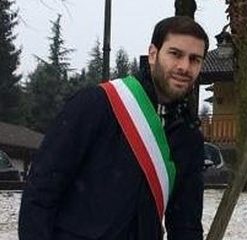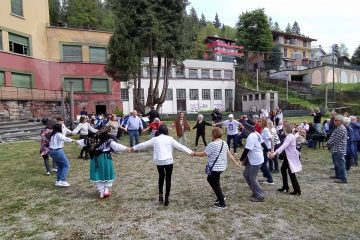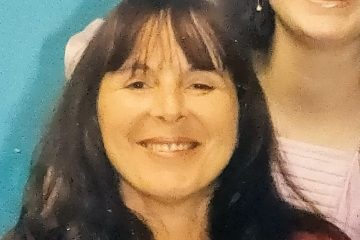Shmuel (Shmulik) Shilo è nato a Lutsk, in Polonia, da una famiglia sionista.
Nel mese di agosto del 1942, nel bel mezzo della Seconda Guerra Mondiale, la maggior parte degli ebrei di Lutsk furono assassinati.
Shmuel riuscì a fuggire, nascondendosi per diversi mesi da una famiglia polacca.
Al suo ritorno a Lutsk, si riunì con suo fratello, e da lì i due vennero portati in un campo di lavoro nazista.
Nel mese di dicembre i lavoratori del campo dovevano essere uccisi, e durante la conseguente rivolta il fratello di Shilo fu ucciso.
Shmuel sfuggì alla morte nascondendosi nella foresta con i partigiani.
Nel 1944, dopo la liberazione del territorio da parte dell’Armata Rossa, si riunì con sua sorella e trovò ospitalità in Italia a Selvino, nella colonia di Scieopoli dove partecipò a un programma di preparazione sionista. Qui imparò l’arte teatrale alla quale deve la sua vita professionale e la sua rinascita.
Nel 1946, emigrò nel nascente Stato Israele sulla nave clandestina Catriel Yaffe.
E’ stato uno dei membri fondatori del Kibbutz Mishmar HaSharon.
Durante la Guerra di Indipendenza israeliana, ha combattuto come membro del Palmach.
Dopo la guerra fu tra i fondatori del Kibbutz Tze’elim.
Nel 1959 si è sposato con Gila e ha avuto 4 figli.
Nel corso degli anni Shilo è divenuto membro di Habimah, il teatro nazionale di Israele, e uno dei primi membri dei gruppi teatrali HaKibbutz e Be’er Sheva.
Nel 1983 ha fondato il gruppo teatrale Hanegev, divenendone il direttore generale e direttore artistico.
Shilo ha partecipato a molti spettacoli, film e programmi televisivi, tra cui Romeo e Giulietta, Il violinista sul tetto, Noa è Seventeen, Discepoli di Stalin, Sesame Street e Prigionieri di guerra.
E’ morto nel 2011, poche settimane dopo avere fatto il viaggio della sua vita, raccontato in questo documentario.
The Opening Ceremony of Holocaust Martyrs’ and Heroes’
Remembrance Day 2008
Address on behalf of the survivors, by Shmuel Shilo
In the winter of 1944 we were liberated by the Red Army. From the Polish partisan base at Panska Dolina I hurried to my hometown of Luck. I wore myself out walking through the streets, hoping to find a Jew. Luck had become a Jewish town devoid of Jews.
Why had I stayed alive? I recall a particularly hard moment, when, crossing the bridge over the River Styr, I started running amok in an attempt to overcome the death wish that gripped me.
I found my sister hiding in a Polish family’s attic, wearing a cross around her neck. The first thing she whispered to me was: “Shmilikl” – I was 14 – “I have remained Jewish”, as she pulled out a page from the Rosh Hashana (Jewish new year) prayers: “Hear our voice, oh Lord our G-d, have mercy upon us!”
“We must flee from this country”, she whispered, “There is nothing for us here. We will go to Eretz Israel.”
On Hol Hamoed Pesach (during Passover), we left Rovno, where the survivors had gathered.
When the end of the war was declared, on May 9th, we were already in Prague. Crowds flocked to the main square: soldiers, citizens – hugging, dancing, exultant with joy – and we, a handful of Jews amongst the celebrating throng, wiped away a tear: tomorrow, they would return home, to their mothers and fathers, their spouses, their children…. but what about us?
We stole across the Austro-Italian border, and there, on the other side, a messianic vision awaited us:
Army trucks….and on each truck, a blue and white Star of David! Hebrew-speaking soldiers rushed out to meet us, and helped us climb up onto the trucks. A few of us burst into tears. It was our first meeting with soldiers who were happy to see us, who wanted us, and were glad we were still alive.
They sent me to the Youth Aliyah home in the town of Selvino, where children aged 4-16 had been assembled. Moshe Za’iri, a member of Kvutzat Shiller, and Reuven Dunat, a Sabra from Haifa, ran the home.
We arrived there serious boys, mature beyond our years. One month later we were playing football and chasing girls. In this home we worked, studied, and prepared for our immigration to Israel. The older ones took care of the youngsters, and did all manner of work. We welcomed in the Sabbath, and celebrated the Jewish festivals. We knew that one day we would reach Eretz Israel, but we didn’t want to come as needy orphans. It was our desire to give, not to take. We asked our instructors to tell us the most important thing we could do for Eretz Israel. Their response: to establish settlements in the Negev and the Galilee.
After the tribulations of sailing the seas in Ma’apilim (illegal immigrant) ships and detention in Cyprus, we came to Israel. We were received into the Youth Aliyah program in the Kibbutzim of Hanita, Mishmar Hasharon, Kfar Ruppin and others. I came to Mishmar Hasharon together with the members of my group. It was our happiest year in Israel. We were supposed to stay there for two years, but battles broke out all over the country, and each day, the newspapers published the names of the fallen. And we were meant to sit and study? Attempts to dissuade us fell on deaf ears. We stopped studying, and together with the other Kibbutz members, we joined the Palmach.
The “Selvino children” fought on all fronts. Two of the fallen are buried in the Kibbutz Tze’elim cemetery: Shlomo Krampf, who was fatally wounded on Mt. Gilboa, and Ze’ev Morshchik, who fell whilst defending Nirim. Every year, the kibbutz Barmitzva boys visit their graves.
They had no parents, siblings or relatives. Both were the last surviving remnant of their families.
The Selvino children established 2 kibbutzim in Israel: Rosh HaNikra in the north, and Tze’elim in the south. Holocaust survivors laid down roots all over the country. They built houses, and raised families: children, grandchildren, even great grandchildren. They worked hard in agriculture, construction, and industry within the IDF. They pursued higher education in the fields of science, economics, teaching, literature, music and theatre. Their love for Israel, their devotion to their homeland is boundless. “We came to Israel to build and to be built…” is more than just a song – it is the essence of our lives, an absolute truth.
I am a member of Kibbutz Tze’elim, married with four children, sons and daughtersin-law, and eight grandchildren. Deep in my heart I know that were it not for the Land of Israel and the State of Israel, my life would have no meaning.















